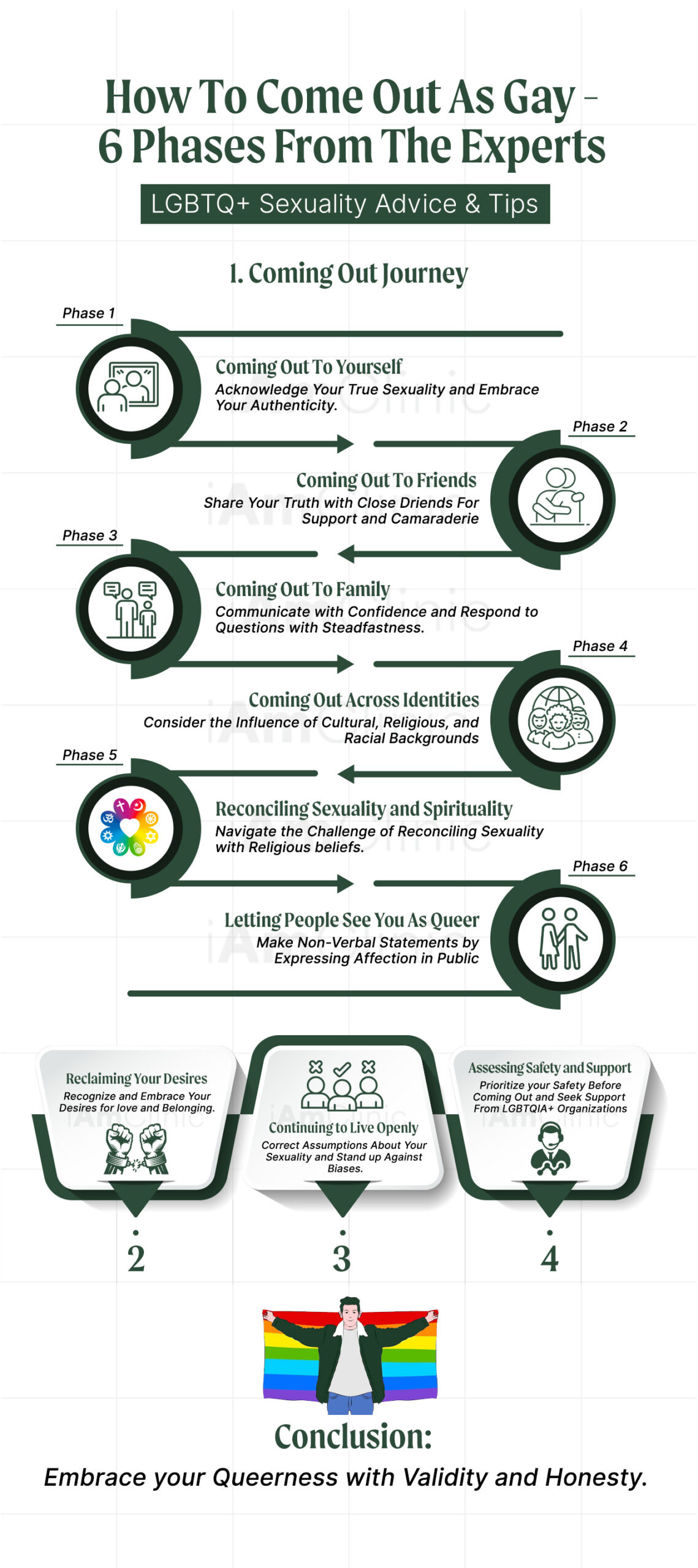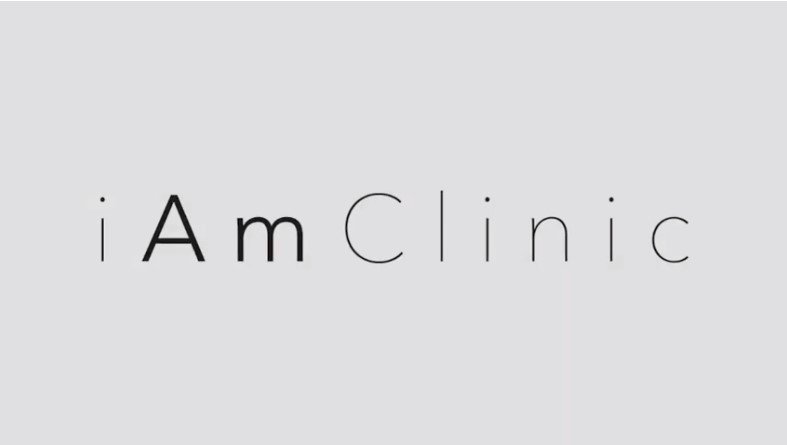Contents
4. Coming Out Across Identities
5. Reconciling Sexuality and Spirituality
5. Letting People See You As Queer
8. Assessing Safety and Support
9. Finding Support and Community
Coming out might just be the hardest, yet most rewarding thing you’ll ever do. It surely was for me, on both accounts.
As I reflect back on that 22 year-old who made the bold decision to tell his parents, I realize that I was doing something more profound than just uttering important words to my folks. I was shifting the trajectory of my life, playing the lead role in my own life’s tale. I was allowing my authenticity to blossom. And much like a flower, my blossoming happened in phases. I hear these coming out phases echoing in queer people’s lives every day. Learn about sexuality counseling here!
1. Coming Out To Yourself
Coming out to ourselves is a big step in honesty. It’s one small thing to say, but a massive thing to let be true. When we admit to ourselves: 1) what is true of our sexuality and/or gender, 2) what has been true about our internal knowing, and 3) what will be of our lives, we gain the ability to unleash all our potential. In other words, coming out is not only a verbal declaration, but an emotional liberation. After we come out to ourselves, we are able to fully live out of our inherent value, and we begin to live from it as a source of fulfillment, not from the motives to do good, be right, and become enough. As we leave the closet, we leave behind the illusion that we need to earn our value.
2. Coming Out To Friends
Most research shows that the first person to whom we verbalize our truth is a close friend. No surprise there! Friends are often our allies, providing camaraderie, support, and a relationship wherein our true self is not only welcomed but cherished. When people feel like they’re coming out in a context with no friends, I recommend first creating a safety network of trustworthy allies who can offer coming out support. We all need a safe shoulder to cry on, if need be. Friends who stick around for the coming out process might just become your new chosen family.
3. Coming Out To Family
Before making any public statements to loved ones who might not be accepting, I recommend knowing your own story. Gather the language that will empower you to answer your anti-queer loved ones’ questions with a steadfast confidence. Your truth and your story is real and happened involuntarily. It’s not a choice. The more we can speak of and describe our closeted history with confidence and appropriate language, the more we are able to stand firm in the face of religious hate or cultural homophobia. Answer questions like:
- When did you first know?
- How did it feel to experience same-gender attractions and, possibly, not want them?
- What did you do to potentially hide or rid yourself of your attractions?
Answers to these questions will dispel the erroneous notion that you “chose” to be gay or that you made the decision out of peer pressure.
I also recommend coming out to parents in a safe relational context. If you feel as though you might experience rejection or persecution, I might recommend waiting to come out to any anti-queer parents until you are stable and able to care for yourself properly. Too often, queer children are left abandoned with few resources. Above all else, take care of yourself before you prioritize honesty.
4. Coming Out Across Identities
Your cultural background, religion, race and other identities can strongly influence your coming out process. Some additional considerations:
- Coming out in ethnic communities can be complicated if LGBTQIA+ identities are taboo or misunderstood. Connect with people who share your cultural identity and sexuality.
- Religious expectations may make families less accepting. Seek out LGBTQIA+-affirming faith leaders who can help you reconcile sexuality and spirituality.
- People of color often face bias compounded by both racism and homophobia/transphobia. Find support tailored to the intersections of your identities.
5. Reconciling Sexuality and Spirituality
This is an extreme feat! I had a majorly challenging—even debilitating—time processing what my religion said about my “sinful” sexuality and how I experienced its innocence. It wasn’t until I started reading scholars with doctorates in New Testament theology that I would even let myself consider the idea that my sexuality was neither wrong, dirty, nor disgusting. Be gentle with yourself and take your place in the driver’s seat of your own spiritual development. Discover what you believe by learning what your Higher Power thinks about you, rather than what some minister tells you your Higher Power thinks about you.
There are hundreds of resources devoted to helping people reconcile their sexuality and spirituality. If you need help accessing these resources, please feel free to reach out to us!
6. Letting People See You As Queer
Although making a public statement is a big step, one of the other profound statements is what we let people see. Showing our affections with our partner over the holidays in front of our loved ones, holding hands in public, or posting romantic and affectionate pictures is a major non-verbal and political statement. Letting people see you as out serves to create a boundary that will give you a ton of freedom and liberty. It breaks the silent barriers that keep us trapped in shame. Being your authentic self in a public fashion carves out an authentic place in the world. It is a brave step that not only breaks the ice but also allows you to find confidence in that what you bring to the table is just as beautiful as any other version of love.

Reclaiming Your Desires
In one of our Queer RelationTip episodes, we interviewed a lesbian wife who grew up in a small Mormon town. After being taught that her desires for love, admiration, and belonging with a lesbian lover were wrong, she left her desires in the closet, along with her genuine personality. After coming out, she felt as though she had to be what people wanted her to be, just like she had while closeted. After taking time to realize that she deserved not only to be happy, but to feel powerful, exuberant, and alive in her own life, she realized that she needed to heal from the ego split by reclaiming her desires.
Continuing to Live Openly
Coming out is not a one-time event. It is an ongoing process throughout your life. After coming out:
- Be prepared to repeatedly come out as you form new relationships and join new communities. It can get easier with practice.
- If you’re safe enough, correct those who assume you’re straight in your daily life. Coming out is stating your truth.
- Stand up against anti-LGBTQIA+ remarks and biases. Your visibility makes a difference.
- Keep surrounding yourself with people who support your LGBTQ+ identity, while being patient with those still learning.
Assessing Safety and Support
Coming out can impact your physical, emotional, and financial safety. Gauge how supportive your environment is before deciding to come out. Some questions to ask yourself:
- Is there a risk you could face violence or be kicked out of your home if you come out? If so, make an emergency plan and reach out to LGBTQIA+ organizations for help before coming out. Your safety always comes first.
- How do your family, friends, school or workplace respond when LGBTQIA+ issues come up? Do they seem hostile or open-minded? Their reactions can clue you into potential support or rejection.
- Does your community have non-discrimination protections? Are there local LGBTQIA+ resources? A lack of legal protections or visibility may indicate increased risk.
Just like that young newlywed, we too have to embrace all the small mechanisms and linchpins that make us queer: our desire for love, our passion, the ways in which we seek, experience and express love, as well as the many other ways our queerness originates within our bodies. We have to let the desires that inform our identities stand with validity and honesty. Don’t hold your desires back, because the moment you do is the same moment you stifle your personality and dim your life.
Finding Support and Community
You don’t have to come out alone. LGBTQIA+ organizations, hotlines and online groups can provide invaluable support.
You have an abundance of support out there. Reach out so you don’t have to come out alone. Learn more about neurofeedback in this FAQ guide.
If you’re looking for professional help, reach out now!


